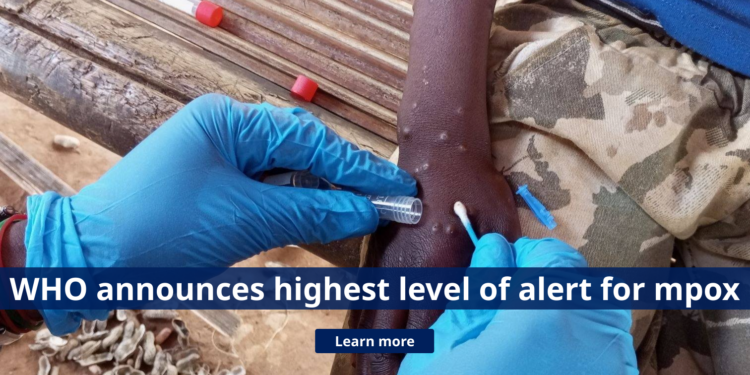Kinshasa, Democratic Republic of the Congo (DRC) — The World Health Organization (WHO) has officially declared the upsurge of mpox in the Democratic Republic of the Congo (DRC) and several other African countries a Public Health Emergency of International Concern (PHEIC). This decision, announced by WHO Director-General Dr. Tedros Adhanom Ghebreyesus, follows the recommendation of an Emergency Committee of independent experts convened under the International Health Regulations (IHR).
The declaration comes in response to the rapid spread of a new clade of the mpox virus in eastern DRC, along with rising case numbers in neighboring countries. Dr. Tedros emphasized the urgency of a coordinated international response to contain the outbreak, stating, “The emergence of this new strain of mpox, coupled with its alarming spread in the DRC and surrounding regions, demands immediate global action. It is critical to stop these outbreaks and save lives.”
Mpox, a disease endemic to central and west Africa, was first detected in humans in the DRC in 1970. While the virus has been present in the region for decades, the recent surge in cases, particularly the new clade 1b strain, has raised significant concerns. This strain, which appears to be spreading mainly through sexual networks, has already been reported in four countries bordering the DRC—Burundi, Kenya, Rwanda, and Uganda—marking the first time these nations have encountered mpox.
WHO Regional Director for Africa, Dr. Matshidiso Moeti, highlighted the extensive efforts already underway to curb the virus, noting that WHO is scaling up its support in coordination with local governments and communities. “We are working on the frontlines, reinforcing measures to contain mpox and prevent further spread. The situation is evolving rapidly, and we must respond with equal urgency,” Dr. Moeti stated.
The PHEIC determination for mpox is the second in two years. The first, declared in July 2022, was related to a multi-country outbreak that spread through sexual contact across several nations outside Africa. That emergency was lifted in May 2023 after a significant decline in global cases. However, the new outbreak in Africa, particularly in the DRC, has reignited global concerns.
Professor Dimie Ogoina, Chair of the WHO Emergency Committee, stressed the global implications of the outbreak, saying, “The spread of a new, sexually transmissible strain of the mpox virus is not just an emergency for Africa but for the entire world. We must act decisively to prevent history from repeating itself.”
In response to the crisis, WHO has initiated an Emergency Use Listing process for mpox vaccines, aiming to accelerate access for lower-income countries. The Organization is also collaborating with partners like Gavi and UNICEF to secure vaccine donations and ensure equitable distribution.
To support the immediate response, WHO has allocated $1.45 million from its Contingency Fund for Emergencies and is seeking an additional $15 million to scale up surveillance, preparedness, and response efforts across the region.
The WHO urges global donors to contribute to the full extent of the mpox response to prevent further spread of the virus and protect vulnerable populations in affected regionns.









